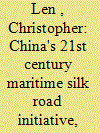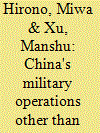| Srl | Item |
| 1 |
ID:
139594


|
|
|
|
|
| Summary/Abstract |
In recent years, the Chinese leadership has increasingly turned its attention towards the maritime domain. This article discusses Beijing's latest attempts to secure China's maritime energy supply chain across the Indian Ocean region and the South China Sea through which the majority of its seaborne energy imports transit. As China increasingly relies on the seaborne energy trade, Beijing has come to attach more importance to the security of the sea lines of communication (SLOCs) and has a growing strategic interest in ensuring unimpeded access in these two areas. In this paper, the author discusses Beijing's efforts in the context of China's maritime power aspirations, particularly the 21st Century Maritime Silk Road initiative which is promoted by the current Chinese President, Xi Jinping. The author argues that Beijing's latest maritime agenda will be hampered by the strategic distrust and political risks China faces in the Asian region.
|
|
|
|
|
|
|
|
|
|
|
|
|
|
|
|
| 2 |
ID:
124742


|
|
|
|
|
| Publication |
2013.
|
| Summary/Abstract |
Although political friction and ideological differences between China and the West can hamper co-operation on missions known as 'Military Operations Other than War', the UK and China have achieved a certain level of success in this regard, particularly in relation to UN peacekeeping and counter-piracy operations. In this article, Miwa Hirono and Manshu Xu argue that the key has been to use multilateral platforms to frame bilateral collaboration, thereby diminishing Chinese perceptions of the associated political risks. Thus it is useful for Western militaries to exploit multilateralism to make military co-operation more attractive to China.
|
|
|
|
|
|
|
|
|
|
|
|
|
|
|
|
| 3 |
ID:
111640


|
|
|
|
|
| Publication |
2012.
|
| Summary/Abstract |
China's double-digit average growth in the last twenty years has built up manufacturing and industrial behemoths that helped move the country from an agrarian society into a major economic player in the global economy. This prosperous growth coupled with construction of urban infrastructures and the rapid adoption of profligate lifestyles has created dependency on energy sources, raw materials and natural resources that need to be secured to maintain commercial, economic, and social wheels turning. In failing to sustain growth and security, both of which are national priorities, the Chinese Communist Party faces ideological and political risks. As a result, China's global resources quest is taking it to faraway lands and its presence as well as its motives and mechanisms raises geopolitical issues around the globe.
|
|
|
|
|
|
|
|
|
|
|
|
|
|
|
|
| 4 |
ID:
111065


|
|
|
|
|
| Publication |
2012.
|
| Summary/Abstract |
The world needs to reduce greenhouse gas emissions to prevent climate change, while meeting the energy needs of developed and developing economies. Recent studies suggest that generation of electricity from concentrated solar power in North African countries and its transmission to Europe could provide European and North African partners with low-carbon electricity.The private capital will be likely required to achieve the scale of new investment and yet the North African region experience difficulties with sustaining high levels of foreign direct investment from the private sector. The literature identifies a number of risks as barriers to investment, and we examine these in the particular context of renewable energy development. We conducted three stages of interviews with stakeholders to learn their perceptions of the risks most likely to affect renewable energy projects. Three class of risks-regulatory, political, and force majeure (which includes terrorism)-stand out as being of high concern. Of these, regulatory risks are perceived as being the most consequential, and the most likely to occur. This suggests that attention to building the capacities of North African countries to develop, implement, and enforce sound regulations in a transparent manner could be an important step in promoting renewable energy cooperation with Europe.
|
|
|
|
|
|
|
|
|
|
|
|
|
|
|
|